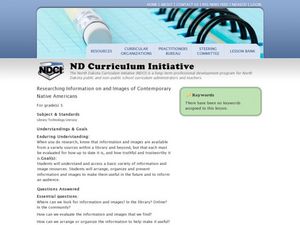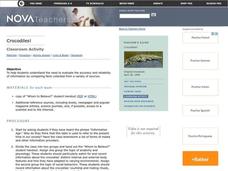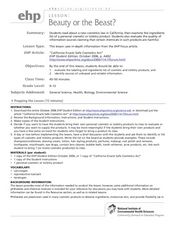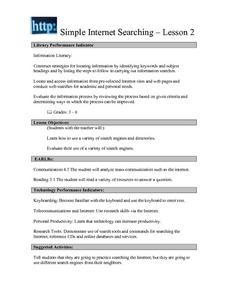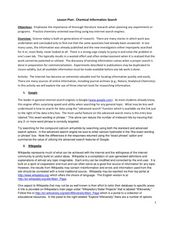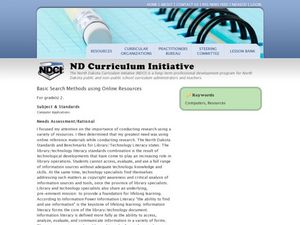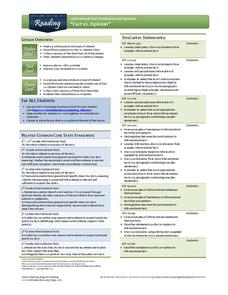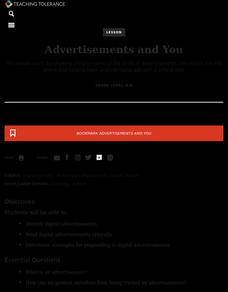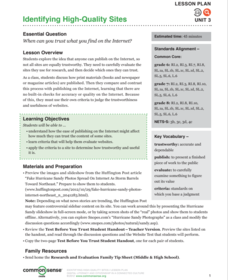Curated OER
Is That a Fact?
Investigate popular scientific claims and gather evidence to defend or argue against an author's stance. Writers synthesize information and compose their own "Really?" columns modeled after those found in the weekly "Science Times"...
Curated OER
Arti-Factual Evidence
Practice responding to controversial information with the New York Times lesson provided here. Middle schoolers watch a video interview with the director of The Lost Tomb of Jesus. After reading a companion article, they identify the...
Curated OER
Hamlet Research Paper: Find, Evaluate, and Select Appropriate Research Sources
Help young researchers find credible sources online. Modeling with a Google search for information about Shakespeare’s Macbeth, use a computer projector or Smart Board to show class members how weak the top three search results are....
Museum of Tolerance
Developing Media Literacy
To protect young people from questionable content, many schools limit access. This resource suggests that because learners can so readily avail themselves to unrestricted Internet access, it is vital for 21st century learners to develop...
iCivics
NewsFeed Defenders Extension Pack
Accuracy, transparency, trustworthiness, and impartiality are four unspoken rules of journalism. Scholars delve deep into the subject by discussing the pros and cons of relying on social media for news. They also play an online game to...
Curated OER
Credible Sources on the Internet: What to Trust, What to Dismiss and When to Cite a Source
Wait, you mean researchers don't all use Wikipedia? Teach your class about intelligent research with a lesson about evaluating digital sources. The lesson starts with a quickwrite and includes vocabulary exercises and several...
Curated OER
Researching information on and Images of Contemporary Native Americans
Research information and find pictures of Contemporary Native Americans in order to help 3rd graders understand what images are available from a variety of resources. They will present their research and pictures to the class. In turn,...
Curated OER
Crocodiles
Work on research procedures in this lesson, which prompts writers to collect and evaluate information pooled from a number of sources. They work in teams to collect information about crocodiles from different sources. They compare the...
Curated OER
Beauty or the Beast
Does the FDA really intend to protect public health? Spark a debate in your chemistry or health class by using this article, titled "Beauty or the Beast." It questions the safety of cosmetics and toiletry products, govenment regulations,...
American Press Institute
Media Literacy: Where News Comes From
What actually happens at a press conference? Make sense of the mayhem with a mock press conference activity designed to promote media literacy. Individuals participate as either members of the press or the governor's office to examine...
Curated OER
Simple Internet Searching Lesson 2
Learn how to use search engines and keywords! Learners evaluate the information process using given criteria and determine ways in which the process may be improved.
Curated OER
Online and Off the Record
Students evaluate how effectively teen Web sites abide by privacy protections of the studenT Online Privacy Protection Act. They write letters to the Webmasters offering recommendations for improving the privacy and appeal of the sites...
Google
Beginner & Intermediate 5: Evaluating Credibility of Sources
Convey how to determine appropriate and credible online sources with a series of three lessons. After completing the lessons, class members will know what kinds of sources to use, how to identify credible sources, and how tone and style...
Curated Video
Detecting Lies & Harmful Links
Who and what can you trust online? How do you know? After viewing a pair of introductory videos on positive and safe online conduct, learners discuss the content and put it into practice during an online search activity about alien life.
Curated OER
Chemical Information Search
Students research information using various internet resources. In this chemistry instructional activity, students demonstrate their ability to navigate websites and gather necessary information. They evaluate the potential usefulness of...
Curated OER
Fighting Fake News
Fake news. Alternative facts. Internet trolls. In an age of Newspeak, it's increasingly important to equip 21st century learners with the skills needed to determine the legitimacy of claims put forth on social media, in print, and in...
Curated OER
Basic Search Methods Using Online Resources
Second graders practice using technology to gather information. In this online research lesson, 2nd graders use technology to find information for a research project. Students write a research paper, and give a presentation to the class...
Newseum
Evidence: Do the Facts Hold Up?
Sometimes it's hard to escape bad information! Pupils learn the E.S.C.A.P.E. method for evaluating news sources and complete a worksheet to assess a news article using their new skills.
For the Teachers
Fact vs. Opinion
Many informational texts are written as factual, but can your learners determine when an opinion is presented as fact? Have your kids read several articles on the same topic and record the statements that contain either facts or...
Teaching Tolerance
Advertisements and You
Watch out for clever advertisements! Using the lesson, scholars learn how to identify online ads and respond to them critically. They then use what they've learned to develop a list of strategies to evaluate web pages.
Curated OER
Evaluating Information Resources
Students identify at least five aspects to be examined in determining the validity of information presented on a website. They classify websites into highly trustable, trustable or questionable information sources. In addition, they...
Curated OER
Seeking, Locating, Accessing, and Using Information
Students complete reserach on a topic of their choice by following the Big Six research program. In doing so, students locate information and assess the validity and usefulness of sources.
Curated OER
Evaluation Expressions
High schoolers explore algebraic expressions in this Algebra I lesson. They evaluate expressions using paper and pencil and then use the TI-83 to provide immediate reinforcements.
Common Sense Media
Identifying High-Quality Sites
Use a Huffington Post article focused on false pictures of Hurricane Sandy to launch a discussion about the reliability of online information. Groups compare and contrast how print and broadcast media regulate data gathering with the...








